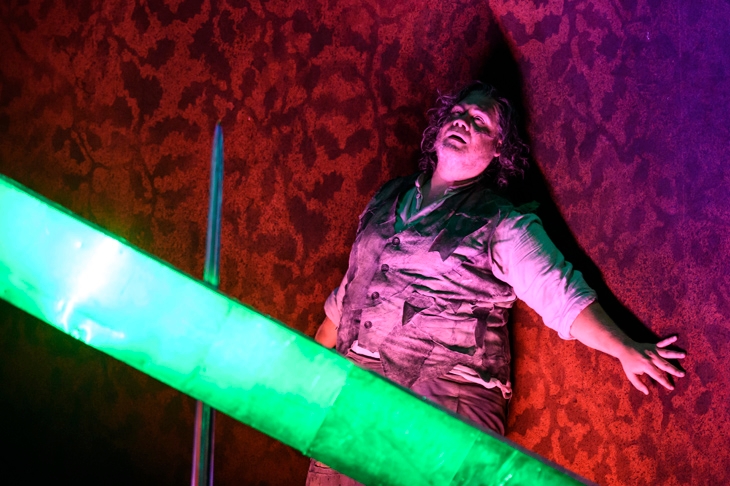‘On Brünnhilde’s rock I drew the breath that called your name; so swift was my journey here.’ It’s Act Two of Götterdämmerung. Siegfried, entoiled in evil beyond his comprehension, has unwittingly committed the betrayal that will tip the whole vast drama into its final collapse, and at this point Covent Garden’s Ring cycle really does feel like it’s swept by in a breath. True, Keith Warner’s 2007 production is looking creaky. But there’s still no mightier assertion of an opera company’s ambition than to stage all four music-dramas of Der Ring des Nibelungen in the space of a week; and no artistic experience remotely comparable to witnessing it.
So, about that experience. First, there’s the sense of time simultaneously expanded and compressed; of epochs lived within the span of four short nights. I’ve heard Handel arias that felt longer than Wagner’s 16-hour saga. Second, and more prosaically, Network Rail caused me to miss Act One of Die Wälkure. Superficially, it’s almost a self-contained drama, and the missing narrative is easily supplied. Yet I kept on missing that act, and not merely because what I did see of Emily Magee’s Sieglinde and Stuart Skelton’s Siegmund was intensely touching, with Magee frantic and sweet-voiced and Skelton singing with warm, wounded nobility, eloquently supported by Antonio Pappano in the pit. Wagner crafts his drama so that not even a minute of the Ring is dispensable. The gap aches like Amfortas’s wound, and I’m planning to try to staunch it when Die Walküre is relayed to cinemas on 28 October.
As to specifics, well it’s old news that Warner and his designer Stefanos Lazaridis spray their ideas about like dragon’s blood. Hits: the Rhine is watery in a computer-game sort of way, there are properly grotesque monsters, and Siegfried forges his sword in a terrifying blaze of pyrotechnics. Misses: Warner violates important character and narrative points (his Wotan actually stabs Erda), and the Valkyrie rock is represented by a blank, alienating white screen, which shrinks Siegfried’s discovery of Brünnhilde to a (literal) shadow play. During Wotan’s farewell to Brünnhilde — the scene in which Wagner enters the mind of a god, and then lets us feel his heart break — Warner had him strolling casually across the stage.
Probably there was a concept at work here, but with Wagner’s inspiration lighting up the stratosphere, it felt more like a failure of nerve. Shaky lighting and video projections that looked like screensavers (at one point, Mime appeared to be menaced by the Windows 95 logo) all suggest a production in its twilight days. Whatever: the cast was magnificent. Everyone expected Nina Stemme to be tremendous as Brünnhilde, and she was — impulsive, ardent and finally, chillingly, resolute; colouring each word and sending arcs of molten tone soaring over all but Pappano’s most uncontrolled climaxes.
John Lundgren as Wotan, Johannes Martin Kränzle as Alberich and Stephen Milling as Hagen seemed cut from different parts of the same vocal cloth, a disconcerting and effective bit of casting that meant that Hagen’s slick, industrial-grade evil came with a black-voiced grandeur that simultaneously echoed and overshadowed the two representatives of the old order. Sarah Connolly’s Fricka curdled from a sensual, frustrated young wife into someone capable of using physical affection like a poisoned needle.
Meanwhile Lundgren’s cocksure, slightly tinny singing in Rheingold deepened and mellowed with his character. By Siegfried, his Wanderer seemed to be having the time of his life. Siegfried was also the point at which — after a baggy Rheingold and a volatile Wälkure — Pappano really started to catch the music’s tidal pull. That might have had something to do with Stefan Vinke in the title role, and if there’s one performance to take away from this cycle it’d be his: no Teutonic he-man, but an awkward, impulsive boy who — in an eerily tender moment with Mime (Gerhard Siegel) — was innocent enough to reveal his own vulnerability. He’s genuinely likeable. Vinke’s playful banter with the Woodbird (Heather Engebretson) prompted unforced laughter from the audience.
The effect is transformative. This Siegfried really is the ‘laughing hero’; the ‘bright-eyed youth’ that Wagner imagined, and who we almost never get. Does it matter that he doesn’t sound like a conventional Heldentenor? Vinke’s dusky middle-register could certainly open out when required. The point was that you didn’t need this compassionate Siegfried to be belting away the whole time. His appeal to Brünnhilde and the ease with which he was destroyed by the Gibichungs made equal dramatic sense. ‘I will only be happy when the person who gets the loudest applause is the person who has acted best, who has shown the character in the truest way, not the person with the best voice,’ said Warner, quoting Wagner, back when this production was fresh. As Wotan says, today you have seen it happen.






Comments